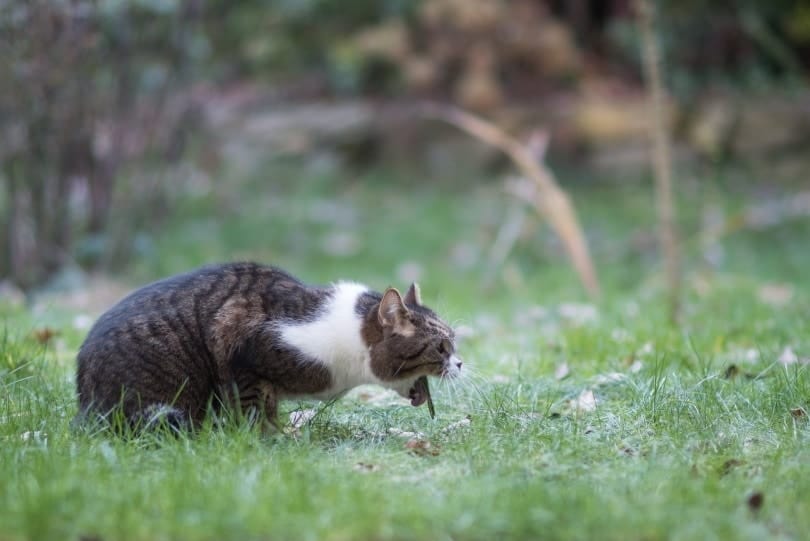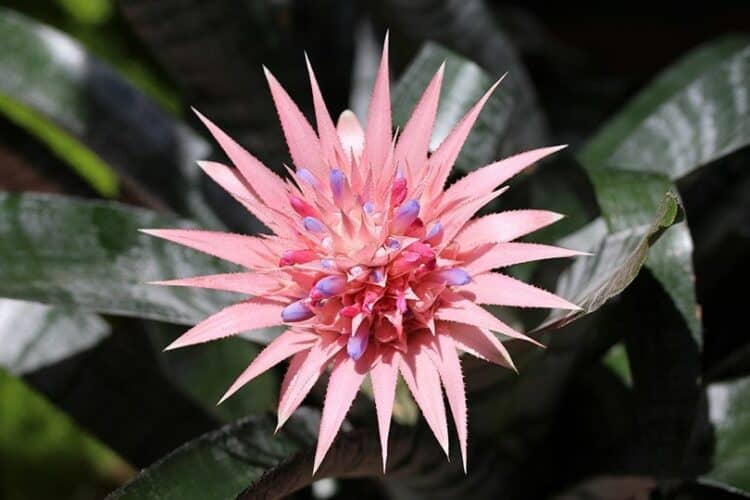As a pet parent, research is a vital first step before placing a new plant into your home, as you need to be certain that it’s not toxic to your cat. Your curious fur baby is bound to end up playing with—and munching on—new additions to your home, and it’s your responsibility to keep them from harm, regardless of how gorgeous the plant may look.
Thankfully, Bromeliads are both beautiful and non-toxic, making them an excellent choice for a pet-friendly home. Amazingly, you won’t be limited with choices either, as these plants include over 3,000 species, available in many different sizes and colors.
What Do I Do If My Cat Eats a Bromeliad Plant?
Cats, especially kittens, are energy balls that need plenty of stimulation, affection, and play. If they’re ready for some fun and you aren’t around, and neither are their toys, your ornaments, rugs, furniture, and plants may be their next target—especially if they’re slightly blowing in the breeze from an open window.
Although Bromeliads aren’t toxic to cats, you should still deter your cat from munching on them. Eating too many leaves and other parts of a Bromeliad can make your kitty sick, resulting in vomiting, diarrhea, and an uncomfortable stomach until the contents have passed through their body. However, your cat should be okay and bounce back in no time.
If the symptoms don’t pass, or if they worsen, phone your veterinarian and explain the situation to them. They’ll either tell you to monitor your cat or bring them in for an evaluation and possible treatment. Unfortunately, your cat may either be experiencing a bad allergic reaction to the plant or may be ill from the harmful fertilizer used on the plant. If you add fertilizer to your Bromeliads, inform the veterinarian of this information.
Signs Of Plant Poisoning
It’s vital to know what to look out for regarding plant poisoning in cats, especially if you’re passionate about various plants and keep them in your home. However, even if all your houseplants are cat-friendly, they may be exposed to harmful plants when exploring, climbing, and playing outdoors.
If you can spot danger signs quickly, you’ll be able to distinguish them from an upset stomach to something more severe. Acting quickly and taking your cat to the veterinarian for treatment may be what saves their life. Cats who have consumed poisonous plants will experience symptoms such as:
- Vomiting
- Diarrhea
- Twitching
- Drooling
- Difficulty breathing
- Swelling
- Seizures
- Confusion
- Lethargy
- Excessive drinking and urination
- Loss of appetite
If your cat is showing these symptoms, phone your veterinarian. If they’re unavailable, call the ASPCA Poison Control Hotline at 888-426-4435, as they’re available 24 hours a day, every day of the year.

Plant Poisoning Prevention
Unfortunately, the best form of plant poisoning prevention is removing the toxic plant from your house completely. If there is nothing dangerous around, your cat won’t be in danger. Your house doesn’t have to be greenery-free as there are many safe plant alternatives, such as Bromeliad plants. Other cat-friendly plants are spider plants, Cast Iron, the Boston fern, Bottle palms, Feather palms, roses, Polka Dot plants, and Orchids.
This doesn’t mean that you must remove every toxic plant from your yard as well. Although there may be a couple of toxic plants outside, they’re usually less dangerous to your cat than toxic indoor plants. Not because of the plant itself but because when your cat is outside, you’re probably supervising them. There’s also so much life and activity outside that they’re less likely to reach a level of boredom that results in plant chewing.
Indoor plants are far more intriguing to cats as they’re in their space at all times, making them more dangerous. Thankfully, cats are obligate carnivores and natural hunters, making them far more likely to try to get a bite out of your fish than they are to get a bite out of your plant!
Conclusion
Bromeliads are cat-friendly plants that are a beautiful and safe alternative to toxic plants in your home. There are over 3,000 species of this plant to choose from, giving you plenty of options to work with. Although Bromeliads are non-toxic, if your cat consumes too much of its contents, they may become sick. However, the discomfort and other symptoms should pass once the contents of the plant have passed through their bodies. If symptoms worsen, take them to the veterinarian.
Featured Image Credit: Pixabay














